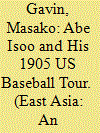| Srl | Item |
| 1 |
ID:
180008


|
|
|
|
|
| Summary/Abstract |
On 4 April 1905, during the Russo-Japanese War, Abe Isoo (1865–1949), the father of baseball in Japan, Christian intellectual, and professor of economics and political science at Waseda University, took his baseball players to the USA to play against American students and local players in California. Amidst the war and growing anti-Japanese sentiment in California, Abe realized his decade-long dream of participating in international athletic competitions in anticipation of such games contributing to the resolution of international conflicts without weapons. His two primary goals were that his students would experience “systematic scientific” baseball on its home soil and that they would broaden their international perspective. The tour marked the first school excursion sent from Japan for an overseas sporting event and also initiated Japan into the arena of international sporting competitions. This paper focuses on Abe’s view of physical education as seen in his 1905 US tour (4 April–29 June 1905).
|
|
|
|
|
|
|
|
|
|
|
|
|
|
|
|
| 2 |
ID:
154233


|
|
|
|
|
| Summary/Abstract |
This study looks at the sources of anti-Japanese sentiment in today’s China. Using original survey data collected in June 2014 from 1,458 students at three elite universities in Beijing, we quantitatively investigate which factors are associated with stronger anti-Japanese sentiment among elite university students. In particular, we examine the link between the Chinese Communist Party (CCP)’s nationalist propaganda (especially patriotic education) and university students’ anti-Japanese sentiment. We find that nationalist propaganda does indeed have a significant effect on negative sentiment towards Japan. Reliance on state-sanctioned textbooks for information about Japan, visiting museums and memorials or watching television programmes and movies relating to the War of Resistance against Japan are all associated with higher levels of anti-Japanese sentiment. The findings suggest the effectiveness of nationalist propaganda in promoting anti-Japanese sentiment. We also find that alternative sources of information, especially personal contact with Japan, can mitigate anti-Japanese sentiment. Thus, visiting Japan and knowing Japanese people in person can potentially offset some of the influences of nationalist propaganda.
|
|
|
|
|
|
|
|
|
|
|
|
|
|
|
|